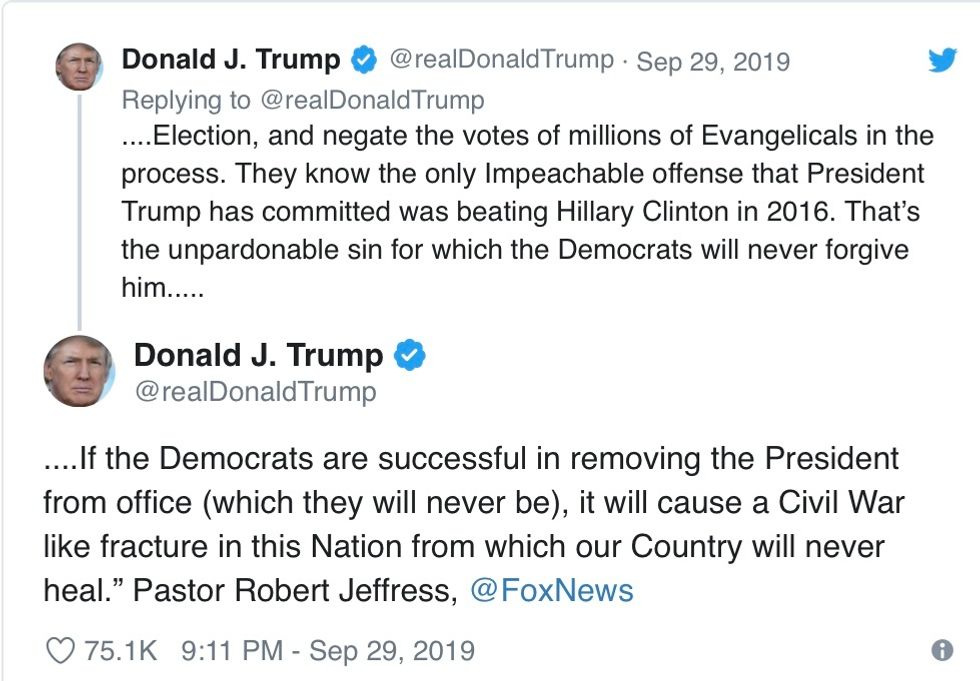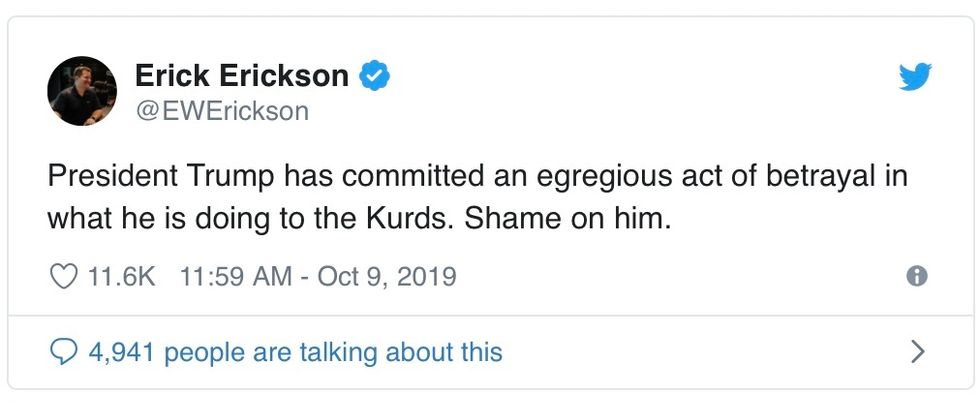Trump's Syria decision divides white evangelicals as impeachment pressure builds.
After Trump announced he was unilaterally pulling U.S. troops out of northern Syria, a potential crack appeared in Trump's evangelical foundation. Here's why.
When President Donald Trump is not attacking pro-impeachment Democrats or Republicans who have dared to question him in public, he has taken public solace in a base re-ignited by conflict. Donations to his re-election campaign are up as the MAGA faithful respond to accusations that Democrats and the media are waging a "coup."
His white evangelical boosters are a big part of this base, with Texas Baptist pastor Robert Jeffress warning of "Civil War-like" division if impeachment proceeds and fellow evangelist Franklin Graham calling the faithful to prayer on Trump's behalf. Last week at the White House, Trump celebrated that some of the "biggest pastors"had called to tell him how "electrified" their congregations are to stand with him.
But after last Sunday night's announcement from the White House that Trump was unilaterally pulling U.S. troops out of northern Syria, a potential crack appeared in Trump's evangelical foundation. Christian media mogul Pat Robertson announced that he was "appalled" by Trump's decision to abandon Kurdish allies by exiting Syria. If Trump does not reverse course, Robertson declared, he is "in danger of losing the mandate of Heaven."
On Tuesday, Tony Perkins, a Trump appointee to the U.S. Commission on Religious Freedom, went on the Christian Broadcasting Network (CBN) that Robertson founded to explain why evangelical leaders who have supported Trump are united in challenging his impetuous decision in Syria. At the moment when he needs defense against the impeachment inquiry, Trump has found one of the few issues that could hurt him with white evangelicals.
As Turkey began its assault, religious conservatives who have consistently rallied to defend Trump called on their followers to pray for victims of the massacre Trump has facilitated.
As Turkey began its assault on Wednesday, religious conservatives who have consistently rallied to defend Trump called on their followers to pray for victims of the massacre Trump has facilitated. "President Trump has committed an egregious act of betrayal," conservative Christian radio host Erick Erickson tweeted. David Brody, the CBN reporter who published a hagiography of Trump last year, retweeted Erickson's assessment. While the caging of immigrants from Central America and the ban on travelers from several Muslim countries did little to shake Trump's support among this group, this betrayal of American allies in a part of the world where white Christians understand the church to be a persecuted minority has sparked defiance in the Trumpvangelical camp.
Though gatekeepers of the religious right were initially reticent to embrace Trump in 2016. he won over the likes of Robertson, Perkins, Jeffress and Graham by parroting their language of traditional values, conservative judges and religious freedom.
But the religious right has also increasingly reimagined "religious freedom" to combine white Christians' concern for the persecuted church in the Middle East with the belief that they themselves are persecuted here at home by liberal neighbors who "impose" their beliefs about the equality of women and the LGBTQ community. Just as libertarians worked to redefine liberty as freedom from government in the late 20th century, the religious right has cultivated a love for religious liberty in the 21st century that makes white Christians in America feel embattled.
Several evangelical leaders have turned this rhetoric of victimhood into a powerful rallying cry. Pat Robertson has worked since the 1970s to build a base of Christians who believe resisting progressive politics is the Lord's work. After Jerry Falwell's Moral Majority proved unable to build a governing coalition of Christian conservatives during the Reagan administration, Robertson stepped forward to lead the religious right with both the financial and communication resources of his global media empire. He hired a young political operative, Ralph Reed, to develop a grassroots strategy to take control of the Republican Party at the local level. Just this week, Politico reported on Reed's plans to rally religious conservatives to re-elect Trump in 2020.
As investigative journalist Anne Nelson has documented in her new book "Shadow Network," Reed has labored for decades alongside colleagues like Perkins and Jeffress in the Council for National Policy. Their efforts have crafted an effective echo chamber for their messaging, which in turn made it possible for a candidate to mobilize millions of white Christian voters by saying the magic words: "religious freedom."
In Donald J. Trump, their network found a fighter willing to embrace their cause. But as their champion's behavior becomes increasingly erratic under the scrutiny of an impeachment inquiry, Trump's future as their chosen one is in doubt. The Trump campaign was so troubled by the united criticism of Trump's usual fans that they rearranged the president's schedule so he could give a speech at the Values Voter Summit on Saturday night.
While a crack in the dam does not guarantee that it will break, it does signal that pressure is building. According to this past week's Washington Post-Scharr School poll, 58 percent of Americans currently support the impeachment inquiry, including 28 percent of Republicans. That significant minority of Republicans matches the 28 percent of white evangelicals who reported support for the impeachment inquiry in this Fox News poll.
If religious conservatives are losing confidence in Trump as God's instrument, the spokesmen of the religious right will likely follow.
For too long, the loud and coordinated voices of white evangelical leaders have dominated our conversation about faith in public life. Now more than ever, we need moral leadership that points us toward the values that bind us together as a nation. This week, more than one hundred Christian leaders joined together to call for a National Day of Prayer for members of Congress and the impeachment inquiry.
As many black and brown Christians have long understood, a public faith that compromises truth for the sake of power endangers all of us. This week, Kurdish Christians — as well as Kurdish civilians of every faith — are suffering from that compromise. If Trump cannot be held accountable, no one knows who is next.
NBCNews, October 13, 2019 Under the title: Trump's Syria decision divides white evangelicals as impeachment pressure builds.
###
October 13, 2019
Voices4America Post Script. As we wait to see where the GOP dam of support for Trump cracks, keep the evangelicals in mind. This article suggests setting Turkey loose on the Kurds may be the start. Read and share - and if you believe, pray! #TrumpGenocide



